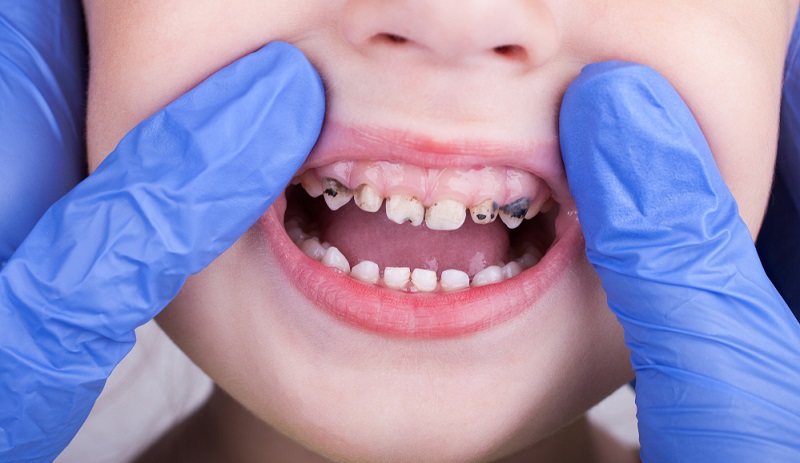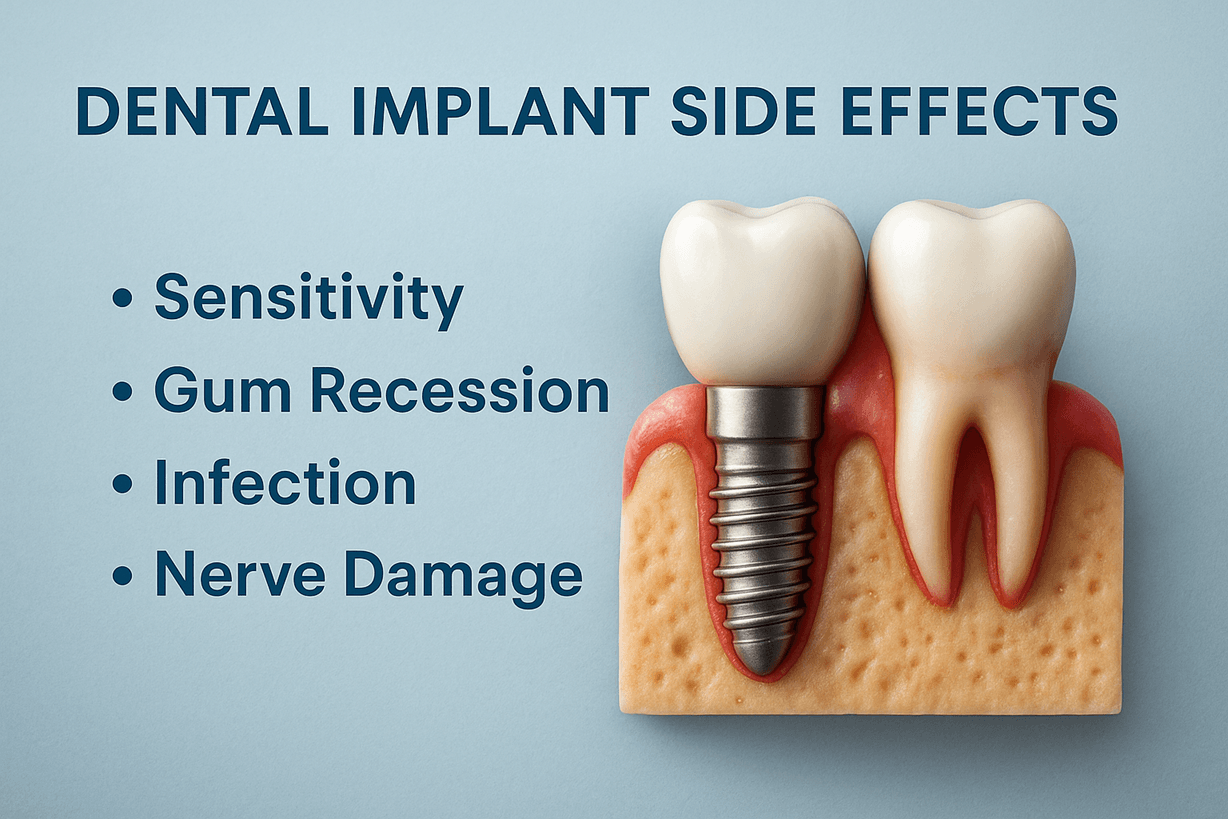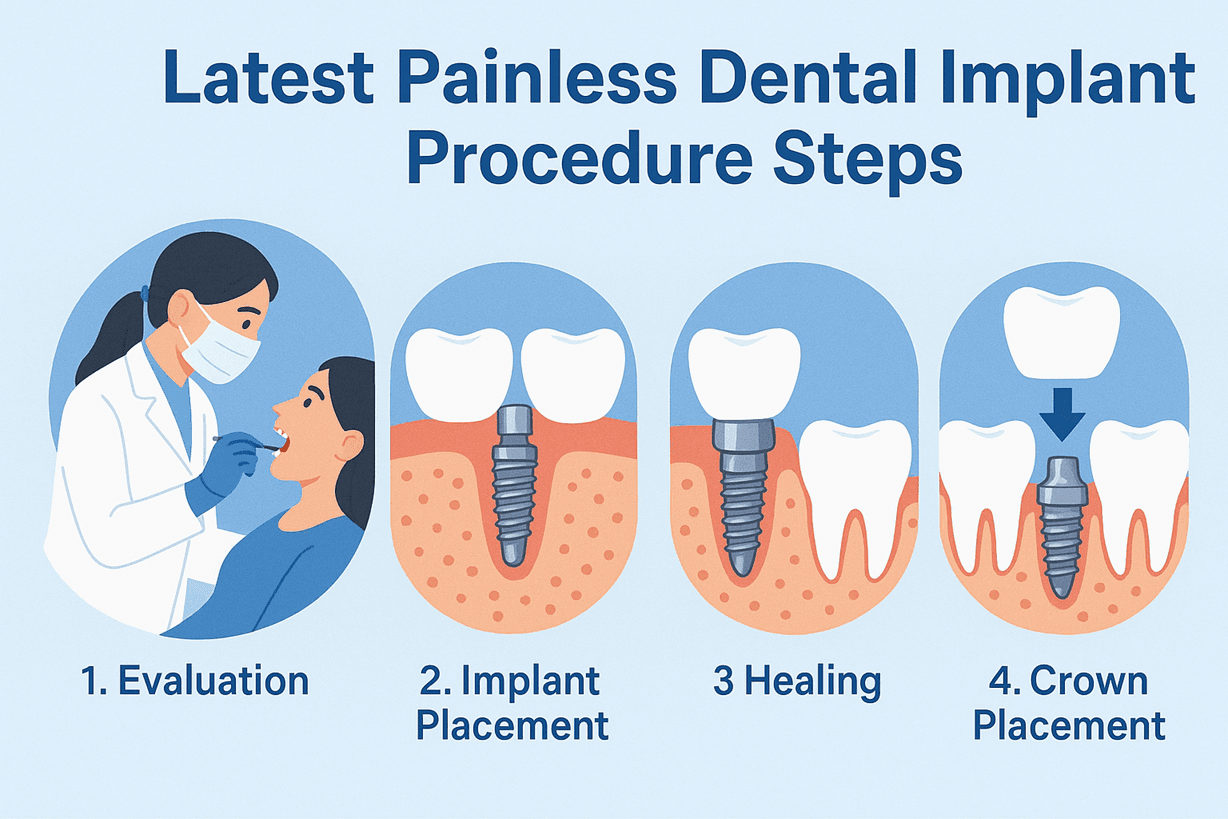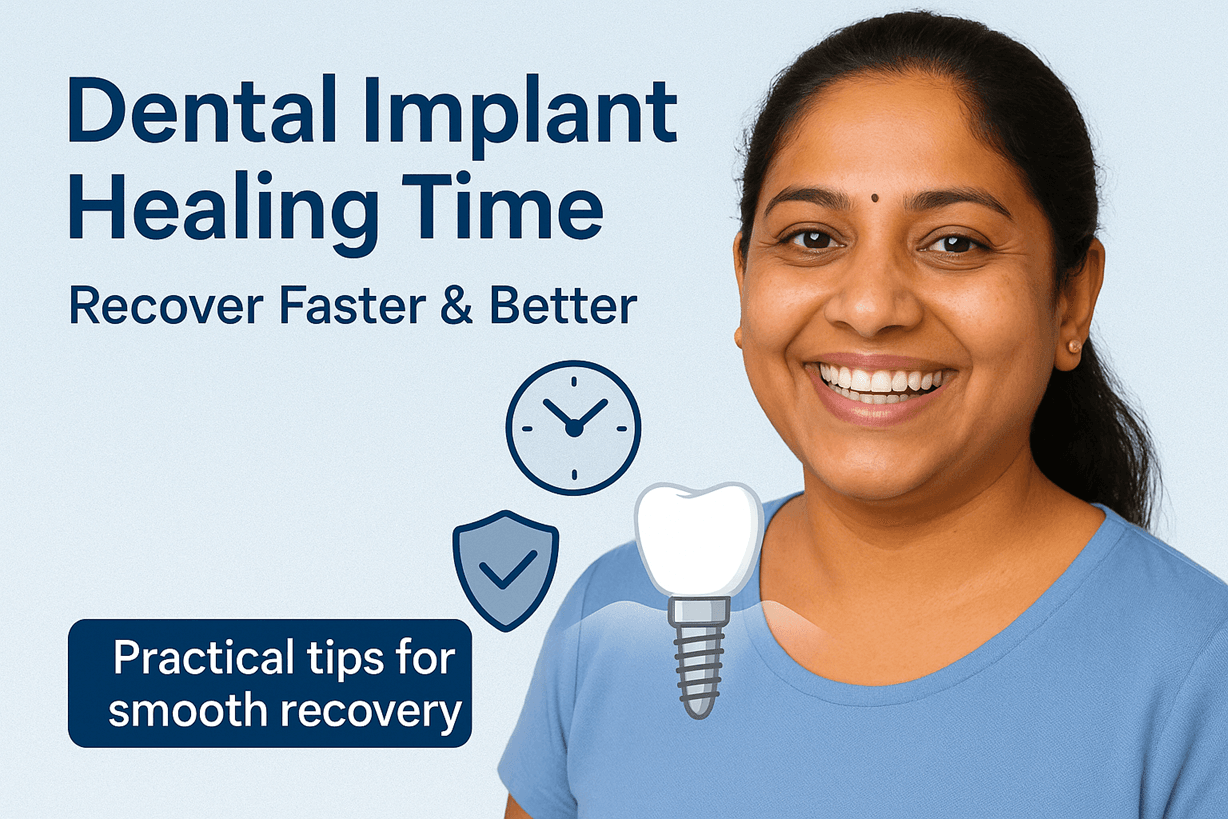Contents
- Introduction
- What Causes Tooth Decay in Kids?
- How to Prevent Tooth Decay in Children?
- 1. Help your child brush their teeth correctly.
- 2. Limit sugary drinks and snacks.
- 3. Schedule regular dental checkups.
- Tips for Parenting and Teaching Your Kids Proper Oral Hygiene Habits
- Nutrition and Diet: Best Foods for Healthy Teeth and Gums
- Regular Dental Checkups: Why They Are Important
- 1. They help prevent cavities.
- 2. They help keep your child's teeth and gums healthy.
- 3. They allow your dentist to spot any problems early.
- 4. They help ensure your child is getting fluoride protection.
- 5. They build good habits for life.
- Alternatives to Traditional Treatments of Tooth Decay
- Conclusion
- Frequently Asked Questions
- 1. What is tooth decay in children?
- 2. What causes tooth decay in children?
- 3. Can front tooth decay cause pain in kids?
- 4. How do improper feeding habits cause tooth decay in kids?
- 5. How to avoid tooth decay for kids?
- 6. How to protect kids from tooth decay?
- 7. How to treat decayed teeth in kids naturally?
Are you frustrated with caring for your child's dental cavities? For both parents and kids, tooth decay may be a frustrating and painful experience.
But don't panic, there are easy stu7n bu6yby6by6eps you can do to guard against tooth decay.

We'll look at some quick ideas in this blog post to maintain your child's smile strong and free of cavities. So let's get started and finally say goodbye to cavities!
Introduction
Preventive care is essential when it comes to cavities. There are additional variables besides sugary foods and drinks that can cause dental decay in youngsters, despite what you may believe.
Here are some easy steps you can take to protect your child's teeth from cavities:
1. Encourage them to brush their teeth twice daily with fluoride toothpaste.
2. Make sure they floss daily.
3. Limit their intake of sugary foods and drinks.
4. Have them eat plenty of fruits and vegetables for their oral health.
5. Take them for regular dental checkups and cleanings.
What Causes Tooth Decay in Kids?
One of the most prevalent paediatric illnesses, tooth decay is also one of the most preventable.
While there are many reasons that might cause tooth decay in children, it's crucial to keep in mind that it can be avoided with good oral hygiene and frequent dental checkups.
Plaque is the primary cause of tooth decay in children. On teeth, plaque, a sticky film of bacteria, develops.
Without being eliminated, plaque can harden into tartar, which is far more challenging to get rid of.
Cavities are brought on by the bacteria in plaque and tartar, which produce acids that erode tooth enamel.
Other factors that can contribute to tooth decay include:
Too Much Sugar in the Diet:
Sugar feeds the bacteria in plaque and helps them produce more acid.
Poor Oral Hygiene:
If plaque isn’t removed regularly through brushing and flossing, it will continue to build up and damage teeth.
Dry Mouth:
Certain drugs or medical disorders may be to blame for this. Teeth are more prone to decay when there isn't enough saliva present because saliva shields teeth from bacterial acids.
How to Prevent Tooth Decay in Children?
One of the most prevalent chronic disorders in children is tooth decay. In fact, it is five times as prevalent as asthma and seven times as prevalent as hay fever. It's good to know that tooth decay can be avoided.
Here are some easy steps you can take to protect your child's teeth from decay:
1. Assist your Child with Proper Tooth Brushing.
Make that they brush for two minutes, twice daily, with a pea-sized amount of toothpaste. You ought to assist them with daily flossing as well.
2. Cut back on Sugary Foods and Beverages.
It's crucial to restrict sugary drinks and snacks because it's one of the main causes of tooth decay.
Try to make water your child's go-to beverage because it is the greatest for their teeth. Additionally, choose fruits and vegetables as snacks rather than candies or pastries.
3. Plan Frequent Dental Examinations.
It's crucial to take your child to the dentist frequently so that any issues can be detected quickly and appropriately.
By their first birthday or within six months of the eruption of their first tooth, whichever occurs first, children should visit the dentist, according to the American Academy of Paediatric Dentistry.
Following that, they should visit a dentist for regular checkups and dental cleanings every six months.
Tips for Parenting and Teaching Your Kids Proper Oral Hygiene Habits
1. Start early:
It’s never too early to start teaching your child about oral hygiene. As soon as your child’s first tooth comes in, you can start cleaning it with a soft, wet cloth.
2. Make it Enjoyable:
Flossing and brushing your teeth don't have to be a chore. By singing songs or allowing them to pick out their own toothbrush and toothpaste, you can assist your child in turning this chore into a game or an enjoyable pastime.
3. Lead by Example:
If you practice good oral hygiene habits, your child is more likely to do the same. Make sure to frequently floss and brush your own teeth, and let them see you do it.
4. Arrange for Routine Examinations:
Don't forget to take your kid in for routine dental exams and teeth cleanings. Any issues can then be identified early and treated before they worsen.
Nutrition and Diet: Best Foods for Healthy Teeth and Gums
Your child's teeth will erupt and start to touch as they grow. At this point, you ought to start considering your role in cavity prevention and oral health.
Although brushing is the recommended method for maintaining clean teeth, did you know that some foods can also be beneficial?
Some of the finest foods for strong teeth and gums are listed below:
1. Cheese:
Cheese is full of calcium, which is good for both teeth and bones. It can also help neutralize the acids in your mouth that can cause cavities.
2. Yogurt:
Like cheese, yoghurt also contains calcium and can help reduce the risk of cavities. It's also a good source of probiotics, which are beneficial for overall dental health.
3. Green Leafy Vegetables:
These foods are high in vitamins A and C, both of which are important for oral health. They also contain folic acid, which has been shown to reduce the risk of gum disease.
4. Nuts:
Nuts are a great source of Vitamin E, which helps protect against gum disease. They're also a good snack option if you're looking for something crunchy and satisfying without being sugary.
5. Water:
Keeping your child hydrated is important for their overall health, and it's also good for their teeth! Water helps wash away food particles and bacteria that can lead to cavities.
Regular Dental Checkups: Why They Are Important
The majority of parents are aware that they should take their kids to the dentist regularly, but many are unaware of how crucial these visits are.
Here are some reasons why your child's oral health benefits greatly from regular dental checkups:
1. They aid in cavity prevention.
Your dentist can identify any early indications of tooth decay and treat you to stop cavities from occurring with routine dental examinations.
2. They support the dental and gum health of your child.
Your child's teeth will be cleaned by the dentist during a routine dental examination, and their gum health will be evaluated.
This aids in clearing away any plaque or tartar that has amassed on the teeth and can spot any early indications of gum disease.
3. They help your dentist detect any issues at an early stage.
Early detection of tooth or gum issues in children is essential to limiting future harm or complications.
Your dentist can see any issues and offer the right treatment if you have regular dental checkups.
4. They assist in ensuring that your child receives fluoride protection.
If your community doesn't have fluoridated water, your dentist can recommend additional methods to make sure your child is receiving the cavity-preventing advantages of fluoride, such as fluoride supplements.
5. They create lifelong positive behaviours.
Early adoption of the practice of routine dental visits prepares your child for a lifetime of healthy oral hygiene practices.
Alternatives to Traditional Treatments of Tooth Decay
There are several ways to treat tooth decay, and many of them do not involve traditional methods.
Some of the alternatives to traditional treatments of tooth decay include:
1. Dental Sealants:
These are little, plastic coverings placed on the back teeth. By blocking off the grooves on the teeth that are most prone to cavities, they aid in the prevention of tooth decay.
2. Fluoride Varnish:
This transparent, thick coating is used to add fluoride to teeth. It provides additional fluoride protection, which helps to prevent tooth decay.
3. Silver Diamine Fluoride:
This substance is applied to the teeth as a liquid. By filling in any minor cavities that may have developed, it helps to avoid tooth decay. Additionally, it lessens tooth sensitivity and discomfort.
4. Homoeopathic Remedies:
Homoeopathic remedies for tooth decay include using products such as homoeopathic toothpaste, gels, and mouthwashes. These products help to neutralize acids in the mouth and promote healing.
Conclusion
To keep your child healthy and happy, it's crucial to take proper care of their teeth.
You may assist your child in maintaining a healthy mouth by using the easy tricks we've provided above to stop cavities from developing.
For even more preventive steps, be sure to schedule routine dental checkups. With these suggestions, you'll be well on your way to kissing cavities goodbye and welcoming a more attractive smile!
Frequently Asked Questions
1. What is tooth decay in children?
Tooth decay is a common dental problem in which the hard outer layer of the teeth (enamel) is damaged and destroyed by acid-producing bacteria.
In children, tooth decay can affect primary (baby) teeth as well as permanent teeth.
2. What causes tooth decay in children?
Tooth decay in children is primarily caused by the consumption of sugary foods and drinks.
When children eat or drink sugary substances, bacteria in the mouth produce acid that can damage the enamel of the teeth over time.
Poor oral hygiene, a lack of fluoride, and dry mouth can also contribute to tooth decay.
3. Can front tooth decay cause pain in kids?
Yes, children can experience pain from tooth decay in their front teeth. Depending on the degree of the deterioration, the discomfort may be moderate or severe.
Children may also experience pain, discolouration, and obvious pits or holes in their teeth as further signs of front tooth decay.
4. How do improper feeding habits cause tooth decay in kids?
Through prolonged exposure to sugary foods and beverages, poor feeding practices can cause tooth decay in children.
For instance, if a child regularly consumes sugary beverages from a bottle or sippy cup, such as juice or soda, the liquid may pool in the mouth and raise the risk of decay.
5. How to avoid tooth decay for kids?
In order to prevent tooth decay in children, it's crucial to promote proper oral hygiene practises including twice-day brushing with fluoride toothpaste and daily flossing.
Additionally, limiting sugary foods and beverages can aid in preventing dental decay. Maintaining good oral health also requires routine dental exams and cleanings.
6. How to protect kids from tooth decay?
Encourage healthy eating habits and restrict sugary snacks and drinks to protect children from dental decay.
Tooth decay can also be avoided with regular brushing and flossing, fluoridated toothpaste, and water. It's also crucial to arrange for your youngster to have routine dental exams.
7. How to treat decayed teeth in kids naturally?
While some home treatments for tooth decay in children may be effective, it's crucial to have professional dental care for treatment.
Clove oil, salt water rinses, and putting a cold compress on the area where the rot is present are natural treatments that could offer momentary respite from the symptoms.



